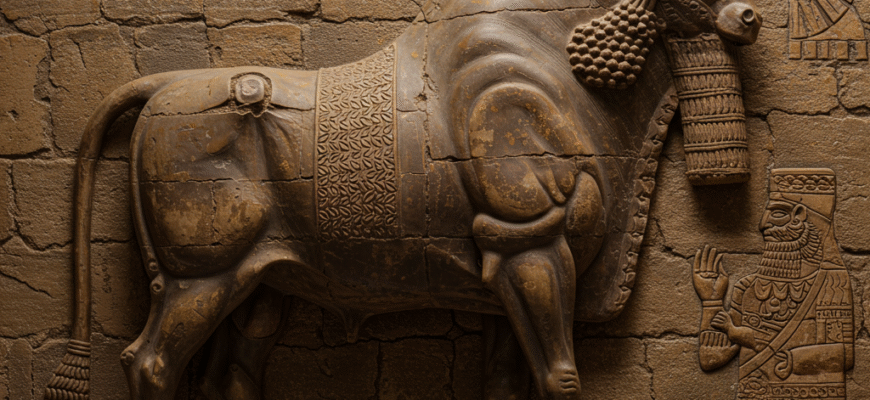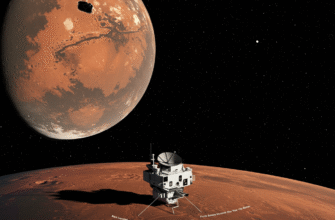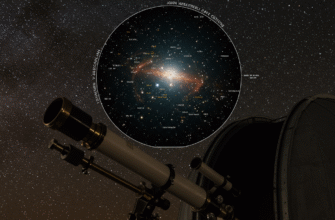The dust of ancient Mesopotamia whispers tales of gods and mortals, of epic battles and divine wrath. Among these, the saga of the Celestial Bull of Heaven, Gugalanna, stands as a stark testament to the fury of a spurned goddess and the perilous courage of heroes who dared to defy the heavens. This creature was no mere beast; it was a cosmic weapon, a manifestation of divine anger capable of wreaking unimaginable havoc upon the mortal realm.
The Spark of Fury: Ishtar’s Rejection
The chain of events leading to the Bull’s rampage began with Ishtar, the powerful and often capricious goddess of love, fertility, and war. Captivated by the heroic stature and renown of Gilgamesh, king of Uruk, Ishtar descended from her celestial abode with a proposition of marriage. She offered him lavish gifts: a chariot of lapis lazuli and gold, storm-demons as mighty steeds, and dominion that would make kings and rulers bow before him. But Gilgamesh, keenly aware of Ishtar’s fickle nature and the grim fates that had befallen her previous lovers, met her advances with a scathing refusal.
He recounted her past amours with brutal honesty: Dumuzi, her shepherd-lover, condemned to the underworld for half of each year; the colourful allallu-bird, whose wing she broke; a lion, perfect in strength, for whom she dug seven pits; a stallion, magnificent in battle, whom she condemned to the whip, goad, and lash. Even a shepherd and a gardener had suffered her displeasure, transformed into a wolf and a spider, respectively. “And if you loved me,” Gilgamesh challenged, “would you not treat me as you treated them?” His words were a public humiliation, a stark rejection that Ishtar, the Queen of Heaven, could not endure. Her pride wounded, her desire thwarted, a cold, burning divine rage began to consume her.
A Father’s Reluctance, A Daughter’s Threat
Seething with indignation, Ishtar ascended to the highest heaven, to her father Anu, the sky god, and her mother Antu. Tears streaming, she recounted Gilgamesh’s insults and demanded vengeance. “Father,” she cried, “Gilgamesh has heaped insults upon me! He has recounted all my wicked deeds, my abominations!” Her demand was specific and terrible: she wanted Anu to create and give her the Bull of Heaven to unleash upon Uruk and its arrogant king.
Anu, wise and aware of the Bull’s destructive potential, was hesitant. He warned Ishtar of the consequences: “If I grant you what you ask, the Bull of Heaven will cause seven years of famine in the land of Uruk. Have you gathered enough grain for the people? Have you grown enough fodder for the cattle?” Anu understood that the Bull was not a precision instrument of revenge but a force of widespread devastation. Ishtar, however, was beyond reason. She assured him that she had made provisions, though her focus was solely on retribution.
When Anu still seemed reluctant to unleash such a calamity for a personal slight, Ishtar resorted to a terrifying threat, one that struck at the very cosmic order. “If you do not give me the Bull of Heaven,” she shrieked, her voice echoing with celestial power, “I will smash the doors of the Netherworld, I will break its bolts! I will bring up the dead to devour the living, and the dead shall outnumber the living!” The prospect of the dead swarming the earth, blurring the lines between worlds, was a horror Anu could not risk. With a heavy heart, he conceded to his daughter’s furious will. The great Gugalanna, the Celestial Bull, was hers to command.
The Bull of Heaven, known as Gugalanna in Sumerian texts, is a prominent figure in Mesopotamian mythology, particularly in the Epic of Gilgamesh. Its unleashing by the goddess Ishtar is a direct consequence of her rage following Gilgamesh’s rejection of her advances. This celestial beast symbolizes immense destructive power and divine retribution, and its episode is a crucial turning point in the epic.
The Beast Unleashed Upon Uruk
The arrival of the Bull of Heaven upon the earth was an omen of unparalleled dread. It descended from the heavens not with grace, but with a terrifying, earth-shattering presence. Its hooves thundered, its hide was said to shimmer with an unnatural light, and its snorts were not mere exhalations but blasts of cosmic power. As it approached Uruk, its legendary destructive capacity became horrifyingly real. With its first mighty snort, a chasm opened in the earth, and one hundred young men of Uruk, perhaps warriors or simply unfortunate citizens, plummeted into its depths, instantly swallowed.
Panic seized the city. The Bull snorted a second time, and another, even larger pit yawned open, claiming two hundred more souls. The air filled with screams and the stench of dust and fear. A third snort, more powerful than the last, tore open the ground yet again, and three hundred more people vanished, victims of the goddess’s incandescent rage. The Bull was not merely killing; it was unmaking the very land, turning Uruk into a death trap. Its presence drained the Euphrates River, causing crops to wither and thirst to spread, prefiguring the famine Anu had warned of. The divine rage of Ishtar had manifested as a relentless, indiscriminate destroyer.
Heroes Rise Against the Celestial Menace
As Uruk reeled under the assault, Enkidu, Gilgamesh’s beloved companion and a man forged in the wilderness, watched the devastation. Though a creation of the gods himself, his loyalty lay with Gilgamesh and the people of Uruk. He declared to Gilgamesh, “My friend, we boasted that we would leave a name for all time. Now we must make good our boast!” Gilgamesh, though perhaps shaken by the divine power arrayed against him, knew he could not falter. The two heroes, united in purpose, prepared to confront the monstrous Bull.
Their battle against the Celestial Bull was a display of legendary courage and teamwork. Enkidu, relying on his wild strength and instincts, took the more direct, dangerous role. He circled the beast, dodging its charges and the deadly pits it created. He managed to seize the Bull by its thick tail, using his immense strength to anchor it, to become a pivot point in the deadly dance. “My friend, thrust your sword between the nape, the horns, and the gullet!” Enkidu cried out, his voice strained but resolute, as he wrestled the thrashing beast.
Gilgamesh, with the skill of a seasoned warrior and the heart of a king protecting his people, saw his opening. He moved with precision and power, driving his sword deep into the Bull’s neck, at the vulnerable spot Enkidu had indicated. The Celestial Bull shuddered, let out a final, bellowing groan that echoed like thunder, and then collapsed, its immense form stilling upon the ravaged earth. Together, the two heroes had slain a god’s prized weapon. They tore out its heart and offered it to Shamash, the sun god, in a gesture of piety, perhaps hoping to mitigate the divine displeasure they knew would follow.
A Goddess Scorned, A Hero’s Defiance
The death of her prized instrument of vengeance sent Ishtar into a fresh paroxysm of fury and grief. She ascended the great walls of Uruk, the very walls Gilgamesh had built, and uttered a terrible curse upon him. “Woe unto Gilgamesh, who has slandered me and killed the Bull of Heaven!” she cried, her voice carrying over the stunned city.
Enkidu, perhaps emboldened by their victory or angered by Ishtar’s continued malevolence, responded with an act of profound defiance. He tore off the Bull’s right thigh – a significant, sacred portion – and hurled it at the goddess, shouting, “If I could only get my hands on you, I would do to you what I have done to him! I would drape his innards over your arms!” This was an insult of unimaginable proportions, a direct affront to a powerful deity. Ishtar, aghast and further enraged, gathered her sacred courtesans, the kezertu, the shamhatu, and the harimtu, to mourn publicly for the Bull’s thigh, turning Enkidu’s act of defiance into a ritual of her wounded pride.
The Gods Decree: A Price for Hubris
The slaying of the Bull of Heaven, coupled with their earlier killing of Humbaba, the guardian of the Cedar Forest, and Enkidu’s egregious disrespect towards Ishtar, could not be ignored by the divine assembly. Anu, Enlil, Ea, and Shamash convened to pass judgment. While Shamash argued in defense of the heroes, pointing out they acted under his implicit guidance at times, Enlil, the king of the gods, was incensed. He decreed that for their transgressions, one of the two heroes must die.
The gods debated. Anu declared that because they had slain the Bull of Heaven and Humbaba, the one who stripped the mountains of cedar (Enkidu) must die. Enlil confirmed this judgment: “Enkidu shall die; Gilgamesh shall not die.” Soon after, Enkidu was afflicted by a mysterious, debilitating illness. He suffered vivid dreams, visions of the grim Netherworld, the House of Dust, where beings sit in darkness, clay their food and dust their bread. He cursed the great door he had fashioned for Enlil’s temple from the Cedar Forest, he cursed the trapper who had first found him, and he cursed Shamhat, the temple prostitute who had civilized him and brought him to Gilgamesh, for he saw his current fate as an outcome of that path.
Shamash, hearing his anguished curses, spoke from the heavens, reminding Enkidu of the joys his civilized life had brought: the companionship of Gilgamesh, rich food, fine clothing. Enkidu, somewhat placated, softened his curses into blessings for Shamhat but knew his doom was sealed. After twelve days of suffering, Enkidu died, leaving Gilgamesh utterly heartbroken and setting him upon his famous quest for immortality, a quest born from the grief and fear sparked by the consequences of defying divine rage.
Symbolism Woven into the Stars
The Bull of Heaven, Gugalanna, was far more than a simple mythological monster. It was a potent symbol laden with meanings deeply resonant with the Mesopotamian worldview. Primarily, it represented drought and famine. Its very name, “Great Bull of Heaven,” and its association with Anu, the sky god, connected it to celestial phenomena. Indeed, many scholars link Gugalanna with the constellation Taurus. The Bull’s rampage, which included drying up rivers and creating chasms, directly mirrored the devastating effects of severe drought, a recurrent fear in the agricultural societies of the Fertile Crescent.
Furthermore, the Bull embodied untamed, chaotic divine power and the terrifying nature of divine retribution. Its unleashing was a direct result of Ishtar’s wounded pride, showcasing how the gods’ potent emotions could translate into catastrophic events for mortals. The struggle against the Bull was thus a struggle against an overwhelming, divinely ordained disaster. Its defeat by Gilgamesh and Enkidu, while heroic, was also an act of hubris, a transgression against the divine order that demanded a heavy price.
The myth of the Bull of Heaven serves as a stark warning about the consequences of defying the gods. Even for heroes like Gilgamesh and Enkidu, victory over a divine entity does not come without repercussions. This story underscores the Mesopotamian belief in a cosmic order where mortals, however powerful, remain subject to the will and wrath of the deities.
More Than Just a Monster
It’s crucial to understand that Gugalanna was not merely a beast to be slain for glory. It was an instrument of a major goddess, a force of nature personified, and a key element in the divine drama. Its presence in the Epic of Gilgamesh highlights the precarious balance between humanity and the divine, and the devastating potential of unchecked divine rage. The Bull’s story serves as a pivotal moment, dramatically altering the course of Gilgamesh’s life and propelling the epic towards its deeper themes of mortality, grief, and the search for meaning.
Echoes Through Time
The story of the Celestial Bull of Heaven, embedded within the larger framework of the Epic of Gilgamesh, has resonated for millennia. It’s a vivid illustration of themes that transcend ancient Mesopotamia: the destructive power of anger and pride (both divine and human), the courage required to face overwhelming odds, the bonds of friendship, and the inevitable consequences of one’s actions, especially when those actions challenge the established order. The divine rage that set the Bull upon Uruk is a chilling reminder of how personal vendettas, even among the gods, can have far-reaching and devastating impacts on the world.
The myth also serves to explore the complex nature of heroism. Gilgamesh and Enkidu act to save their city, a heroic deed. Yet, their actions, particularly Enkidu’s insult to Ishtar, are tinged with hubris, leading to tragedy. The Bull of Heaven remains a powerful symbol of nature’s fury when provoked by divine will, a cosmic force that tests the limits of human endurance and valor, and a stark reminder of the awesome, often terrifying, power attributed to the gods of old.









